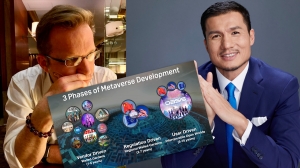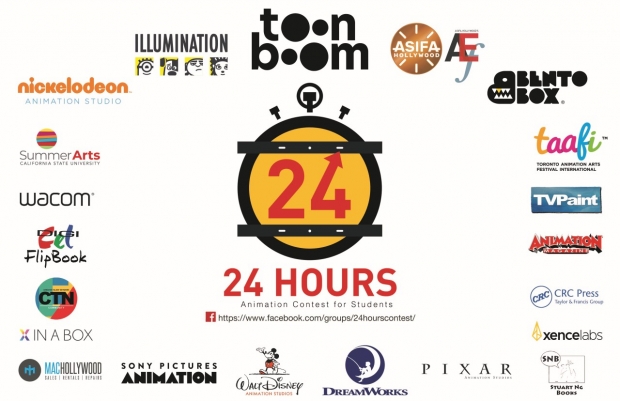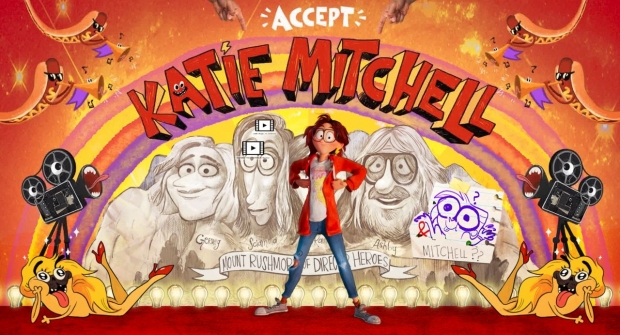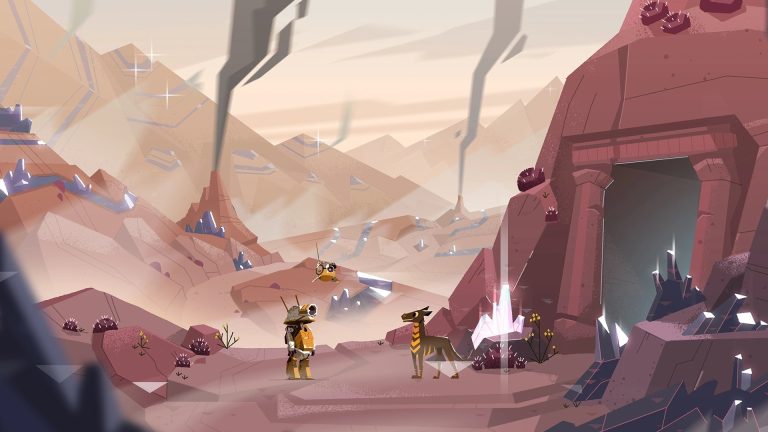KEVIN: (laughs) Indeed. Your observation that the world is in a strange place prompts another question. Your role as China President HTC has been challenging on a number of fronts: technically, financially and politically — one I can relate to as Disney’s former VP of China Local Content Production. When I think of you doing business in mainland China, I envision someone standing with each foot on a different sea turtle, hoping that they move in the same direction and that one or the other doesn’t take a dive.
ALVIN: Yeah… and then they could try to hack your crypto passwords, maybe also your social profile, and BOOM: they’ve taken your stuff and you have no recourse.
ALVIN: Well, the VIVERSE is already available online for people to use, though far from its final form. Over the next six months, we’ll be releasing updates, adding more functionality, more creative creator toolsets, and so on. We currently have a few hundred creators who we’ve given accounts to — called “pods” — in which they can build worlds. Our tools are compatible with existing content creation platforms such as Unity, Unreal and others.
ALVIN: I think for China, it’ll take a few years, during which time we’ll see a highly advanced regional Chinese metaverse — using Chinese currency, crypto and policies. And this Chinese metaverse will achieve critical mass very fast, given the population advantage. Although it won’t be a global metaverse per se, I think it will generate learnings that can be applied in other parts of the world.
ALVIN: (laughs) Yeah, I mean… do you really want everyone to see how much money you have in the bank, and how many other assets you have? Do you really want all of that to be visible to anyone who wants to look at it?
ALVIN: Hopefully more pros than cons, if we have anything to say about it.
Glass vaults
Final words
ALVIN: Yes. And you know, in five years it may be called something other than the metaverse, but it will be some kind of interconnected, 3D-visualized, spatial model of the internet. I think that’s definitely going to happen. And sure, some countries will try to restrict some of it, but there’s no reason for them to block all of it, because that reduces their economic relevance in terms of how they play in the global economy.
ALVIN: And the bigger the metaverse gets, the more important that relevance is. For example, if people in the rest of the world can’t buy stuff from Alibaba, then Alibaba is not as valuable. If people in China can’t access sites for music or games or other content, then those things become less valuable. So, I think that pragmatic business forces will move things along. And sure, you’ll always have places like North Korea where things will be closed off, but those are very unique cases in an otherwise globalized marketplace. We’re going to see a continued globalization of the workforce enabled by the metaverse. And it won’t just be about call centers. It’ll be about tutoring, medical assistance, elderly care, virtual tourism… pretty much anything you can imagine. Just about every service industry can become virtualized in the metaverse economy. And governments will want their workforces to have a place in this global marketplace, because they can earn money internationally and then spend it in their own countries. So, it really doesn’t make sense for anyone to block things off.
ALVIN: Honestly? While I think that transparency is generally a good thing, it may not always be.
ALVIN: Yeah, and that’s the problem: blockchain transparency makes that information available not only to your banks and trusted contacts, but to anybody. I can use an app to find your account number, check your NFT market history, and see if I’m linked with you on any transactions. I can find out exactly what you have, who you got it from, how long you’ve been transacting, who you’ve sold assets to. It’s not necessarily a good thing.
ALVIN: Well, a dime a dozen of geniuses will hopefully help society progress in some way.
ALVIN: (laughs) Yeah, so I think sensitive metaverse content will be an issue. And I would expect that individual countries will manage that content according to some evolution of the laws that they currently have. You know… the world is in kind of a strange place right now. No matter what your point of view, nobody’s happy. (laughs)
In my recent piece here on Reality Bites, “Metaverse = Multiverse,” I referenced the December 2021 Dao Insights interview in which Alvin asserted that the metaverse isn’t geographical, and the April 2022 Forbes interview in which Alvin subsequently acknowledged the reality of “walled gardens” in the near term.
ALVIN: Hey, my pleasure. Good to see you.
KEVIN: You seem to be describing a sort of “Law of Gravitation” which builds to a critical mass of people attracted to a global metaverse marketplace in the same way that they currently are attracted to physical and e-commerce marketplaces. Is it fair to say that you see economic inevitability here?
KEVIN: So, when the VIVERSE hits its stride, how will it address these important issues?
Naturally, my question was how corporate restrictions and political restrictions will produce interoperable, open systems. Given our friendship, Alvin agreed to discuss this in an informal Zoom chat — myself in Taipei and he in Beijing…
KEVIN: (laughs) I understand. I lived and worked in China for 12 years. It seems analogous to the Chinese movie industry, where China Film Group is the only studio authorized by the government to import foreign films into mainland China.
Layer cake
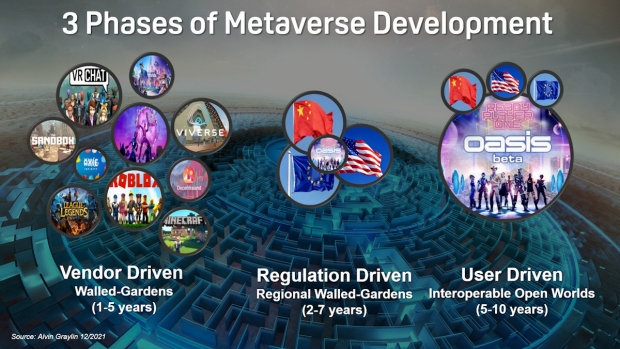
ALVIN: Well, initially there will be issues because they’ll be on different blockchains. So, if you’re operating in a certain crypto ecosystem, you may be constrained by something that was minted on a particular chain and can’t be sold or transferred outside of that context. So, I think there will be a parallel world on that front for a while, until policies come into place that support international exchange. Currently, Chinese people are allowed to own crypto, but they can’t sell it. It’s legal to own crypto, but you can’t exchange it in China — and companies can’t do ICOs. But you can use USD to buy Ethereum and put it in your wallet. VIVERSE will allow you to own different digital assets for application to virtual goods from various territories around the world, within local regulations.
KEVIN: What about China?
Where does HTC come in?
ALVIN: Well, this relates to what we announced a few months ago: our VIVERSE initiative. HTC is creating an open world platform and toolset to allow any device to interact with any other device, globally. You can get onto the web with whatever is at hand and be in this spatial metaverse: meeting with people from around the world. You don’t even need a VR device. Of course, when you have a VR device, your metaverse experience is fully immersive. And we’re building in cryptocurrency support that is Western-centric, but will also have options that are China-compliant.
KEVIN: Yes.
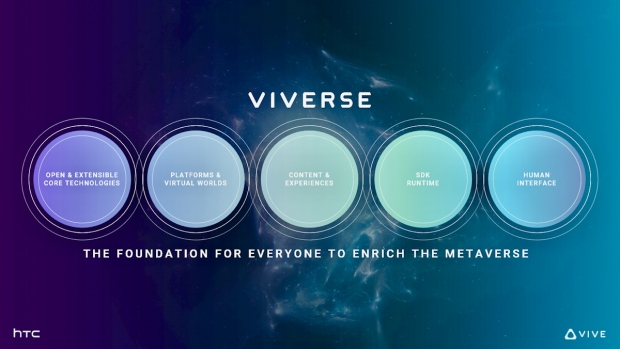
ALVIN: I have. And there are companies out there — I won’t name names — who are building devices that can switch modes seamlessly. You’ll have the combination of AR heads-up display mode, a “holodeck” mode where you have video throughput of someone in a VR environment, and then full virtual reality mode: complete simulation of a virtual environment.
A million Einsteins
ALVIN: I’m very optimistic about the macro trend of the metaverse concept happening, and that trend enabling a greater global economy and greater global understanding — and hopefully creating a more egalitarian society in which people can earn income from anywhere in the world, using anything from a phone to a VR headset. I’m also optimistic about the opportunities, not only to create things, but to learn things: to experience other cultures, to attend classes anywhere in the world, to be part of the global community.
ALVIN: You seem to be referring to the metaverse as a digital twin or advanced AR-verse. That vision is a bit different than what I’m seeing. When I refer to the metaverse, I’m thinking about a fairly immersive virtual environment. That said, there could be metaverse applications which function essentially as an AR cloud layered over the physical world, and depending on which vendor you’re using, you might indeed see different things. The modalities of interfacing with the metaverse are currently tied to our devices in very specific ways — but VR, AR and XR will all be experienced in a single form factor five years from now.
KEVIN: (laughs) Let’s hope.
The China-verse
KEVIN: Likewise. It’s been a crazy couple of years.
Alvin & I
ALVIN: Yes, but you can also set up a simple virtual art gallery in no time. VIVERSE won’t be fully developed for a while in terms of the full experience — but we’re allowing different devices to work together, and different worlds to work together. You can log in with an email account or a crypto account and have access to different worlds with direct transactional capability. We’re trying to make the metaverse accessible for everyone, no matter your entry point.
ALVIN: Yes.

KEVIN: So, what’s HTC’s goal?
ALVIN: There’s a company in China that’s trying to be that bridge. They’re one of the few officially-sanctioned chain vendors, so to speak. They’re semi-government-owned, semi-corporate-owned, but they’re also… it’s complicated.

KEVIN: So, you think there will eventually be a transaction avenue? You’ll be able to transfer assets in or out within certain limits, with the blockchains being used to verify where funds are coming from and what they’re being used for?
ALVIN: I think so, yes. If you look at what’s happened over the last 500 years, the world has become increasingly globalized in terms of travel, trade and education. The metaverse is essentially another model of the world, and the world wants to be as open as possible because it’s more beneficial for everyone: trade happens more easily, people can get access to more goods and services, you can buy things more affordably and sell things more broadly. Those economic forces are going to push the metaverse towards that open marketplace. Whether that takes five years, ten years or more is anyone’s estimate, but it’s inevitable. Of course, some regional markets will move a bit faster towards that shared space than others.
KEVIN: (laughs) I know where you’re going with this: you mean if you have a glass vault in which everyone can see everything that you have, that might not be such a good thing.
KEVIN: Alvin, this has been a great discussion — and I’m bursting with followup questions on the points you’ve made — but I need to let you go. Thank you so much for your time and insights, and let’s chat again soon.
KEVIN: I think what you’re saying really speaks to the point that every technology has two sides: a blade can be used to kill someone or to save a life. The internet has certainly had its pros and cons, and I think we’ll see much the same thing with the metaverse.
ALVIN: (laughs) That’s an apt analogy.
KEVIN: Final question: what are you most optimistic about with respect to the metaverse?
KEVIN: So, you think that market forces of economics, engagement and network value will drive people to more open areas of the metaverse?
KEVIN: So, people who want to build cool stuff can do it?
ALVIN: Exactly. And this has already happened to people, such as Seth. So I’m a bit worried about this ideal of “transparency”… in the financial context, in the medical context… do you really want everyone to know all of that?
KEVIN: Alvin, thank you for participating in this followup to my previous piece on the metaverse. I appreciate you taking the time.
KEVIN: So, we’ve discussed business, but let’s talk about content, and I’ll use an intentionally provocative example. Activist AR art pieces were common around the world well before the metaverse became a topic of water cooler conversation. If you have the right app, you can see the Wall Street bull crapping CGI money, courtesy of the Occupy Wall Street protests. You can also see geolocated AR works related to historical events in China that would probably get you busted if someone saw you viewing them on your phone. Can you imagine a future in which we might have overlapping metaverses staking conflicting conceptual, ideological and territorial claims over the same given geographic location?
ALVIN: On the most practical level, I think it will interface with the world through bridges in business, much as it currently does. There will be some sort of stable cryptocurrency exchange, and there will probably still be import/export controls in terms of verifying where money comes from, and regulating how many dollars per year you can use to buy foreign goods & services. Right now, I can’t take more than ,000 USD out of China per year.
KEVIN: (laughs) Same here.
KEVIN: Right. There’s no one to turn to in a decentralized ecosystem.
KEVIN: One of the purported benefits of blockchains, according to blockchain evangelists, is the notion of transparency. Do you think that blockchains will be transparent in equal measure around the world, or will “transparency” mean different things in different territories?
ALVIN: Great question. You’ve seen my previous presentations, and you know that I talk about how what we refer to as “the metaverse” is just the next incarnation of the existing internet. And if you look at the internet — while it’s not completely open and it’s not completely interoperable — it’s fairly open and fairly interoperable. Most of the time, most people can get to most of the sites they want to. Obviously, there are different restrictions in different parts of the world related to objectionable content — porn, gambling and so forth — and also politically or culturally sensitive content. But for the most part, people can use any tool they want — a phone, tablet, PC or VR headset — get onto the internet, and go where they like. And that’s where the power of the internet comes from. It’s the ability to have that open access. And the value increases according to Metcalfe’s Law: the more nodes on that network, the more beneficial it is. The value increases at the rate of nodes squared. So, if there are more apps and opportunities in an open metaverse, people are going to go there. And if there are many people in an open metaverse, that will attract even more people.
ALVIN: Yeah, so they’re the only company I’m aware of that’s allowed to pursue this. But within China domestically, Alibaba has their own NFT chain, and Tencent has their own NFT chain, among others. The point is that if you’re using a China-approved chain, there should eventually be some mechanism that allows cross-border transactions — with certain limits and restrictions — just as with any financial institution.
ALVIN: (laughs) To put it mildly.
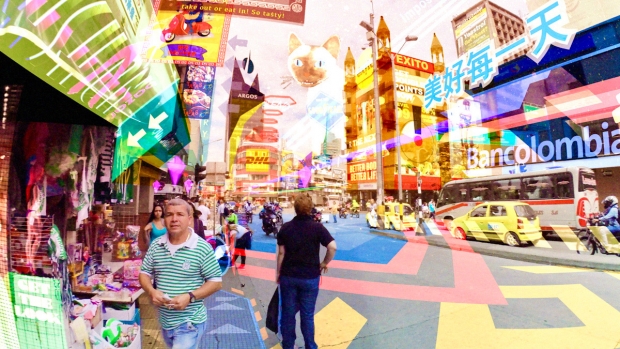
ALVIN: And perhaps some of these people who bubble up to the surface will cure cancer or solve some of the big problems that people say are inevitable, such as climate change. There are so many challenges out there.
ALVIN: Yeah… so many common IRL practices will persist in the metaverse, but the goal will still be to stay in play and do business.
KEVIN: (laughs) And then they’ll be a dime a dozen.
I’ve known Alvin Wang Graylin, China President of HTC, for some time. Our paths often crossed at various VR-related events, and our views sometimes crossed on various VR-related topics. I always appreciated that Alvin understood the good intentions behind my admittedly contrarian POV, and that he was always game for a frank discussion of the issues.
ALVIN: There could even be some non-geographic political worlds that are created in the metaverse, where people could participate quite directly and elect their own governments. And anyone anywhere in the world could be part of that. They could control their own economies and mint their own currencies. The metaverse can provide the freedom for people not to be yoked to the place they were born, or to be limited by their economic background or social class. I think this is something that’s quite powerful, because since the beginning of human history, your opportunities were pretty much determined by where you were born and who your parents were. But with the metaverse, we’re no longer bound to specific geographical locations or social classes. I think that this will allow us to discover so much more, and people will contribute to society in increasingly intelligent ways. So, instead of finding an Einstein once every generation, we may find one once every year… or once a month.
Kevin is the author of AWN’s Reality Bites blog, his musings on the art, technology and business of immersive media (AR, VR, MR) and AI. You can find Kevin’s website at www.kevingeiger.com and he can be reached at holler@kevingeiger.com.
KEVIN: So, softball question: what is HTC doing to facilitate this third phase of a user-driven, interoperable open metaverse?
KEVIN: You can become “hacker honey,” where you’re suddenly a target, like Seth Green. (laughs)
ALVIN: We want to set an example of what a healthy, open metaverse platform and experience should be — as opposed to being tied into hardware and software that you don’t necessarily have or want. We’d like to show what’s possible in terms of flexibility, to provide a hub for the things you need and want to do.
The million-dollar question
ALVIN: So, I think certain regulations will remain because every country — not only China — wants to ingest money in from overseas and digest it domestically. Make it easy to bring it in, and hard to get it out. (laughs)

KEVIN: And how do you see that playing out in practical terms? I’m not trying to single out China, but it’s a prime actor in metaverse technology with a rather polarized point of view. How do you see this extremely advanced, but highly regulated, Chinese metaverse opening up to the rest of the world over time?
KEVIN: And how will those East/West cryptocurrency ecosystems speak to each other?
KEVIN: So, in that earlier piece, I referenced observations you’ve made about the metaverse — including your acknowledgment of a future of commercial and regional “walled gardens”. After the piece was published, you emailed me to clarify that you see those walled gardens not as a final destination, but as a path through which we will eventually arrive at a metaverse of user-driven, interoperable open worlds.
But Alvin has posited three stages of metaverse development: a phase of vendor-driven walled gardens over the next 1-5 years, an overlapping phase of regulation-driven regional walled gardens over the next 2-7 years, followed by the third stage — a phase of user-driven interoperable open worlds 5-10 years from now.
KEVIN: One would think.
KEVIN: My dad once told me: “Never let anybody know how much money you have or don’t have.”
ALVIN: Happy to. Thanks for having me.
KEVIN: So, it seems like there’s some business white space there — regulations permitting — to be the platform that is able to leverage assets that exist in one metaverse ecosystem over to another.
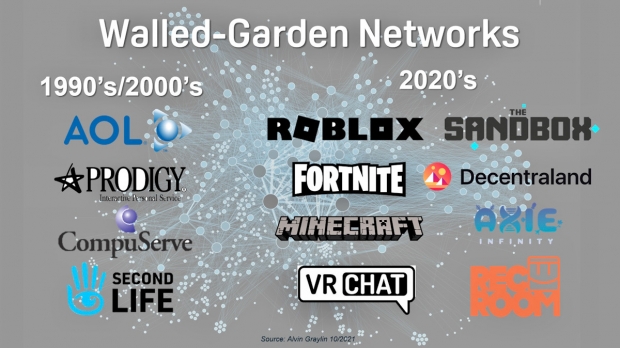
ALVIN: Yes. I think as long as governments around the world can monitor where things are coming from and going to — and for what purpose — exchanges and transfers should be permitted. And that’s what we’re in the midst of creating with VIVERSE: a metaverse model based on a common underlying platform.
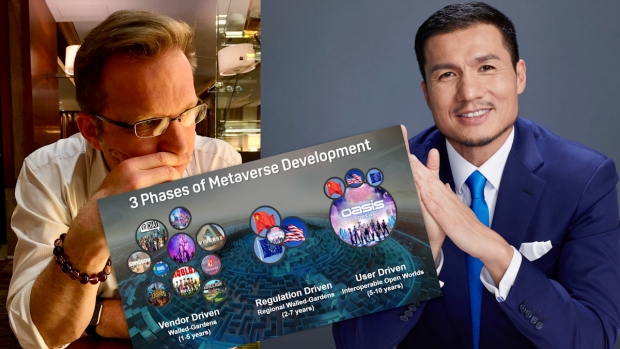
KEVIN: So, the million-dollar question is: How do restrictions plus restrictions equal freedom? You’ve said that vendor-driven walled gardens may persist for the next five years, overlapped by a period of regional walled gardens framed by diverse regulations in the USA, the EU and China. But you’re optimistic that 5-10 years down the road, the metaverse will enjoy a phase of interoperable, open worlds in the hands of the users, not the gatekeepers. What happens to cause those commercially and politically constrained phases to ease up and lead to an open, interoperable, empowering metaverse?
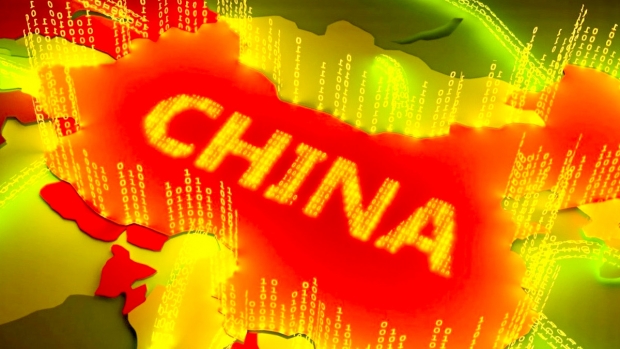
KEVIN: So, back to my question…
KEVIN: You’ve spoken about that convergence at length.
Critical mass

KEVIN: (laughs) I hear you. I still have a lot of cash tied up over there.
